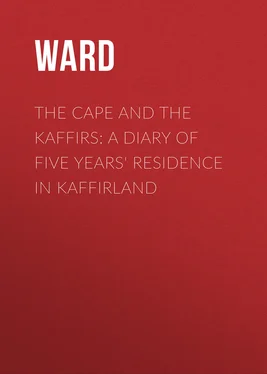Ward - The Cape and the Kaffirs - A Diary of Five Years' Residence in Kaffirland
Здесь есть возможность читать онлайн «Ward - The Cape and the Kaffirs - A Diary of Five Years' Residence in Kaffirland» — ознакомительный отрывок электронной книги совершенно бесплатно, а после прочтения отрывка купить полную версию. В некоторых случаях можно слушать аудио, скачать через торрент в формате fb2 и присутствует краткое содержание. Издательство: Иностранный паблик, Жанр: foreign_prose, История, foreign_edu, foreign_antique, на английском языке. Описание произведения, (предисловие) а так же отзывы посетителей доступны на портале библиотеки ЛибКат.
- Название:The Cape and the Kaffirs: A Diary of Five Years' Residence in Kaffirland
- Автор:
- Издательство:Иностранный паблик
- Жанр:
- Год:неизвестен
- ISBN:нет данных
- Рейтинг книги:4 / 5. Голосов: 1
-
Избранное:Добавить в избранное
- Отзывы:
-
Ваша оценка:
- 80
- 1
- 2
- 3
- 4
- 5
The Cape and the Kaffirs: A Diary of Five Years' Residence in Kaffirland: краткое содержание, описание и аннотация
Предлагаем к чтению аннотацию, описание, краткое содержание или предисловие (зависит от того, что написал сам автор книги «The Cape and the Kaffirs: A Diary of Five Years' Residence in Kaffirland»). Если вы не нашли необходимую информацию о книге — напишите в комментариях, мы постараемся отыскать её.
The Cape and the Kaffirs: A Diary of Five Years' Residence in Kaffirland — читать онлайн ознакомительный отрывок
Ниже представлен текст книги, разбитый по страницам. Система сохранения места последней прочитанной страницы, позволяет с удобством читать онлайн бесплатно книгу «The Cape and the Kaffirs: A Diary of Five Years' Residence in Kaffirland», без необходимости каждый раз заново искать на чём Вы остановились. Поставьте закладку, и сможете в любой момент перейти на страницу, на которой закончили чтение.
Интервал:
Закладка:
We reached the Zwart-kops, the spot appointed for our out-spanning for the night, (unyoking the oxen and turning them out to graze) at about five o’clock. The scene was certainly very beautiful. Imagine a vast plain of fair green meadow-land, intersected, and in fact divided into parterres, by tall thick bushes, which here and there grew in clumps and copses, giving the ground the appearance of a vast park laid out with a great deal of taste,—an amphitheatre of hills and mountains rising one behind another, till the summits in the distance blended with the clouds, gorgeously illuminated by the rays of the declining sun, whose glory was soon succeeded by the milder light of the “gentle moon,” beside which the comet, in strange contrast, spread its long and fiery tail. One by one the tents had risen “side by side in beautiful array.” Arms were now piled; the younger soldiers, tired with their first march, lounged on the ground in clusters, till roused by the older and more experienced men, who despatched them to gather wood and fetch water; and more than a hundred fires soon lit up the camp.
In a short time our own preparations for comfort, refreshment, and repose had been made. The tent was pitched, the fire lit in the nearest bush, and the kettle and gridiron put on. We had brought with us an Indian kitchen (Jones’s Patent Indian Kitchen), a most compact thing; but, unfortunately, it had been packed up in a chest too securely to be got at without much trouble; and, as we were only a party of three, we resolved on doing without it as long as we could. For any number of persons it is invaluable, but for two or three a gridiron, kettle, and saucepan are, or ought to be, enough. Our servant had also put away the bellows and the hatchet; and, though the wind sometimes served us in lieu of the one, we were frequently obliged to borrow the other, when we halted. Having cold fowls, tongue, bacon, bread, butter, tea, sugar, and a bottle of milk 11 11 It is very unsafe, when travelling in Southern Africa, to trust to procuring anything on the road; such a chance is very uncertain. Milk, boiled with plenty of white sugar, will keep good if bottled, for three days at least.
, and good store of wine, in our provision-basket, we did uncommonly well, roasting our potatoes in the ashes, comforting ourselves on the cold grass (not having thought of a tent-mat or table), with some warm negus. A piece of string wound round the pole of the tent, held a wax candle, but the wind rendering its light flickering and uncertain, we stuck a bayonet in the ground, and it made a very convenient and certainly characteristic candlestick. The meal and its fragments having been cleared away, our beds were made in the tent, which had been comfortably pitched (by an old soldier of the 27th, long used to the colony), with its back to the wind; we were thus screened from that, and could not well be inconvenienced by a shower.
Comparative quiet and much order now reigned in the camp. Every tent became more clearly defined as the evening advanced, and the sky formed a darker background for the moon, the stars, and the refulgent comet. Round the fires were assembled groups of soldiers, women resting themselves, as they called it, poor creatures, with babies on their knees,—Hottentots playing their rude violins, and merry voices joining in the chorus, led by neighbouring singers. Sounds of mirth issued from the tents of others; and the steam of savoury soup gave evidence of the proximity of the mess-tent and the talents of “little Paddy Farrell,”—the incomparable cook. Dinner there was always late, the officers never sitting down to solace themselves with good cheer till their men had been well cared for, and their different positions established for the night. Now and then the brazen tongue of a bugle intruded its call upon the stillness of the hour, and helped to disperse the groups gathered round the fire for a time, till the duty to which it had summoned them being done, they either returned to the social circle they had left, or secured a corner in a tent “licensed to hold fifteen inside” to sleep in. Gradually, the voices of the singers became mute; the feeble cries of sleepy infants superseded the monotonous tones of the Hottentot fiddles. Snoring “matches” seemed to be “got up,” as it were, between sundry waggon-drivers and their neighbours, they having their mats spread under the waggons; the peals of laughter among the revellers became less frequent, and at length ceased altogether. The fires grew dim, and the moon and her companions in the sky alone lit up the scene; tents were closed and the sound of the last bugle died away in the hushed night air, leaving all silent, peaceful, and at rest.
Although only fifteen miles from Port Elizabeth, I had been led to expect that I should hear the distant cry of the jackal, and the howl of the wolf; but, in spite of the bed being spread upon nothing but grass, in spite of the more than “whispers of the night breeze” which would be heard from under the flap of the tent, I never slept so soundly in my life.
I was up and dressed with my child, ready for the march, at half-past five. The scene of that morning, though of a different character, almost equalled in beauty the one we had so much admired on the preceding evening. The regiment was drawn up on a natural parade of smooth green turf, bounded by bush, and the background of the eastern hills was glowing at the approach of the sun, who, as he advanced in radiant majesty, tipped with gold the glittering arms and appointments of the soldiers, and shed an acceptable warmth upon us as we left the dewy grass, for the rough and stony mountain road before us. Up this hill the regiment wound, preceding the waggons,—now presenting a glittering cluster of arms, and now being altogether lost to the sight in the thick bush with which the ascent was clothed. A long line of nineteen waggons brought up the rear, and, as we proceeded, four hundred men in advance—women, children, and baggage, wending their way slowly and steadily after them, I could not but commune in my own mind on the ways of that inscrutable and unquestionable Providence, by the working of whose will, England, from her original state of ignorance, insignificance, and barbarism, is now the chief ruling power in the world, and sendeth her ships and her soldiers, (in defiance of what to other countries would perhaps be insurmountable obstacles, when we consider the dangers and difficulties arising from climates and localities ill-suited to European habits and constitutions), “even to the uttermost parts of the earth.”
The day (March 8) became dreadfully hot; towards noon the sun had full sway. Not a cloud shaded the heavens; and, though the country we passed through was rich in bush, there were no shady trees, and water was extremely scarce.
The men being much fatigued with the previous day’s march, it was determined to divide the next long march of thirty-two miles into two; and such an arrangement was not only merciful but absolutely necessary, as man by man fell by the roadside overpowered with the heat, foot-tired and faint for want of water. About one hour before we halted on the second day, we came suddenly upon a pool, where a large herd of sheep and goats (the property of a neighbouring farmer) were drinking. The men shouted aloud joyfully; and rushing precipitately to the pool, put their lips to the element, (which, though muddy, was to them most grateful), and drank copiously of the unwholesome draught. Several became ill after doing so; and, instead of being refreshed by it, were rendered less capable of proceeding than before. Fifteen stragglers fell out of one company, and were probably only induced to crawl after the battalion that evening by the dread of wild beasts. On reaching Sunday River, we learned that such a fear was not without a foundation, as five lions had, within the last few days, been seen drinking at the river side. Most gladly did I find, on reaching the “Outspan,” that a bed could be obtained at the snug, small house of Mr Rose, the Field-Cornet, close to the encampment: there, too, we obtained fresh butter, a leg of mutton, and some good English ale and porter, but rejoiced most in copious ablutions and clean bedding. My companions laughed much at my increased admiration of an encampment by moonlight that night, as I left it for a comfortable roof. “It certainly,” said I, “is a very pretty sighted— at a distance .”
Читать дальшеИнтервал:
Закладка:
Похожие книги на «The Cape and the Kaffirs: A Diary of Five Years' Residence in Kaffirland»
Представляем Вашему вниманию похожие книги на «The Cape and the Kaffirs: A Diary of Five Years' Residence in Kaffirland» списком для выбора. Мы отобрали схожую по названию и смыслу литературу в надежде предоставить читателям больше вариантов отыскать новые, интересные, ещё непрочитанные произведения.
Обсуждение, отзывы о книге «The Cape and the Kaffirs: A Diary of Five Years' Residence in Kaffirland» и просто собственные мнения читателей. Оставьте ваши комментарии, напишите, что Вы думаете о произведении, его смысле или главных героях. Укажите что конкретно понравилось, а что нет, и почему Вы так считаете.












